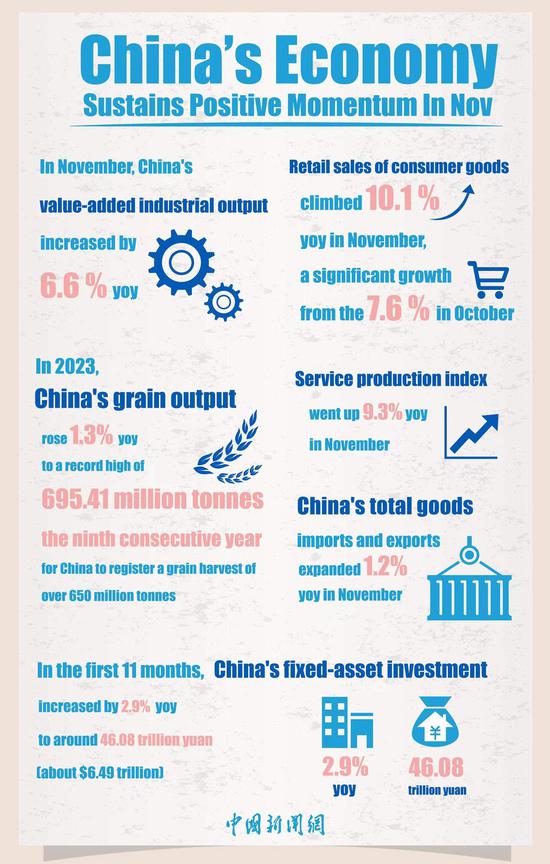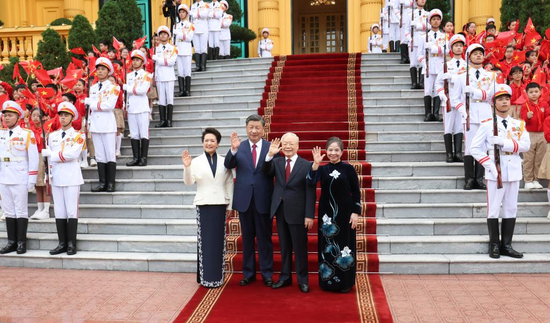
A livestreaming host promotes sales of products with local characteristics during an expo in Fuyang, Anhui province. (WANG BIAO/FOR CHINA DAILY)
The Christmas-to-New Year's Day week is typically preceded by peak shopping in many parts of the world; but in China, livestreaming has been making people go e-shopping all the time. Salespeople double up as hosts or presenters and face cameras to peddle all sorts of products, services, technologies and content in real time.
Their studios or rooms could be professional-grade facilities or simple spaces equipped with ordinary smartphone stands, purpose-built lighting equipment and microphones. Whatever it is that they try to hard-sell, these influencers wax eloquent about it in a way that could give career FM radio jockeys a complex.
Crucially, they have injected fresh vitality into traditional e-commerce platforms by capturing consumer eyeballs and boosting sales. There is a whole army of livestreaming hosts out there, with some of them hitting pay dirt already.
Their content could get utterly riveting. As a consumer, I am familiar with livestreamed sales shows of Li Jiaqi, a top livestreaming host known as "lipstick king". After long work days, watching his shows, I found, helps me wind down.
Of course, Li's lively way of recommending cosmetics, skin care products, snacks and other stuff, which come with discounts, coupons and similar attractions, stimulates my desire to shop.
Data from Tmall, Alibaba's online marketplace featuring established brands, showed that Chinese shoppers (including yours truly) prefer bargains via livestreaming on e-commerce platforms.
Sales via 29 livestreaming rooms of Taobao Live, Alibaba's livestreaming arm, surpassed 100 million yuan ($14 million) during a brief period after the multiday Singles Day shopping festival kicked off at 8 pm on Oct 31.
As the growth of China's traditional e-commerce sector has been slowing, most of online retailers have encountered some bottleneck or the other, like trouble in acquiring new customers. Against that backdrop, livestreaming now plays an increasingly vital role in helping them gain new data flows in lower-tier cities and even rural areas.
According to market consultancy iiMedia Research, China's e-commerce segment based on livestreaming earned a sales revenue of 1.4 trillion yuan in 2022, up 19.5 percent over 2021. It is projected to reach 2.1 trillion yuan in 2025.
Chinese shoppers are willing to devote their attention to more novel platforms that blur the boundaries between entertainment and retail. E-commerce via livestreaming, of the kind provided by the likes of Douyin and Kuaishou, does precisely that, said consultancy Bain &Co in a report.
Leading Chinese retailers are gearing up to fully exploit content-led retail innovations such as e-commerce via livestreaming, the report said, adding retailers can still win by adapting and combining shopping and entertainment through livestreaming and other innovations.
"Livestreaming has become a key method widely adopted by consumer brands to retain existing users, capture new ones and boost sales revenue," said Cui Lili, director of the Institute of E-commerce at the Shanghai University of Finance and Economics.
There is an interdependent relationship between top livestreaming hosts and e-commerce platforms. So, livestreaming influencers or internet celebrities should offer high-quality content, not just sell products, to attract more user traffic, she said.
In addition, livestreaming with virtual hosts is a new trend now. Global consultancy Forrester said more business-to-consumer brands are using virtual hosts to attract digital-savvy and novelty-seeking young consumers. Virtual hosts cost less. What's more, they don't create celebrity scandals that could hurt a brand's image.
Qianxun Holdings, one of China's top livestreaming companies, rolled out an AI hosting service and a one-stop AI livestreaming service platform.
Tao Yadong, a partner of Qianxun Holdings and CEO of Qianyu Intelligence, said it costs about 150,000 yuan to 250,000 yuan each month to run a traditional livestreaming room with a dozen workers and equipment. In comparison, brand owners just need to spend several thousand yuan to operate a virtual livestreaming room helmed by a virtual host.
The performance of virtual hosts in terms of gross merchandise volume, average view duration, number of viewers and transaction rates is better than that of human hosts, he said.


















































 京公网安备 11010202009201号
京公网安备 11010202009201号